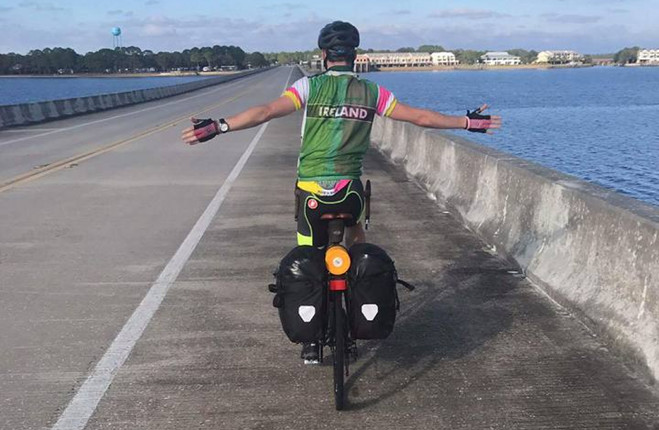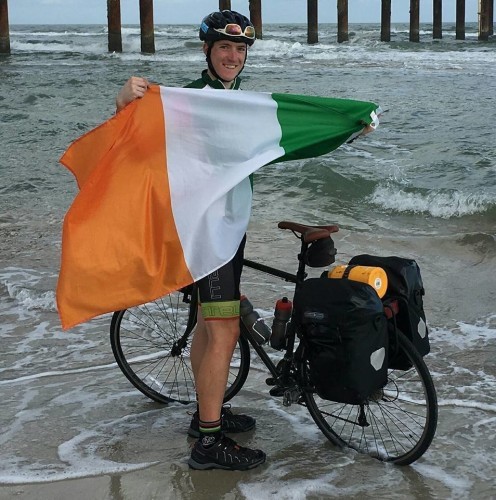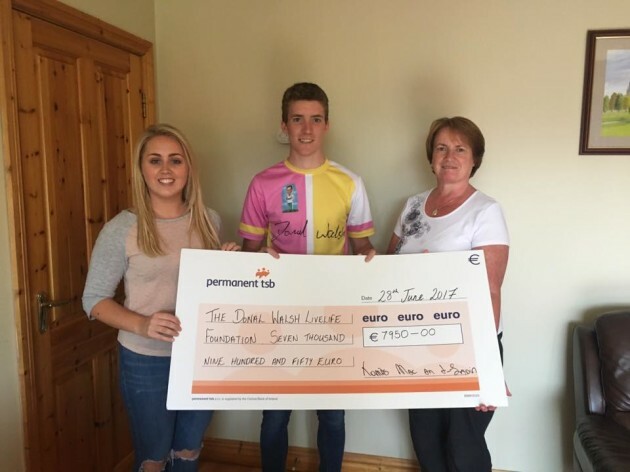“I THINK IT was Lafayette I was in when we last spoke. It was east Louisiana, so I was almost finished by then – I only had a couple of weeks left.
“From there, I crossed the Mississippi River – followed by a few storms, of course. I eventually got into Florida and I’d met another cyclist by then, a fella called Steven Hardy-Braz – he works as a psychologist in the U.S. army.
“I was with him for three or four days but he was continuing north up to Carolina. Lovely lad.”
It’s a year to the day since a young Kerryman by the name of Tomás Sears rode into St. Augustine, northeast Florida, crossing a self-assigned finish line having traversed the North American continent aboard a bicycle.
He speaks on this occasion from his home in Ballyferriter, a year older and wiser, certainly, but while still aged just 23, affixed to a life juncture with which most Irish 20-somethings are more than familiar: what in God’s name do I next?
His 3,000-kilometer trek across the States will be difficult to usurp, not least because while accruing an enlightening life experience he raised close to €8,000 for the Donal Walsh Live Life Foundation – this in honour of his late fellow Kingdom native, who through his writings and RTÉ appearances inspired a nation back in 2012 and 2013.
It was both Walsh’s vivacity and, subsequently, the extraordinary work of his foundation which inspired Sears to push his own boundaries. He crossed the Atlantic on a plane and peddled the rest of the way like a madman, both imparting and absorbing plenty more inspiration en route.
“I eventually finished up on the 11th of November,” says Sears. “I arrived into St. Augustine and a few of the locals came out to meet me. There was a local Irish pub called Meehan’s – a lad from Monaghan runs it – and he threw a little mini-party for me. Ah, the whole thing was brilliant.
“I had started in San Diego, in California, and then I just pretty much followed the Mexican border as far as Texas. I went more inland to central Texas, and then just as I approached Louisiana I drifted towards the Gulf of Mexico again, because I wanted to get to the sea and the beaches.
“I think by the time I saw my first beach it was five weeks into the journey. To see the beach again was nice, because I live by the beach. It’s two minutes away from my house, so…
“I suppose what drove me to do that trip was that I’d finished my college degree and I’d always planned on taking a year out. I knew I wanted to go travel, and I love cycling as well, so I said: ‘why not combine them?’
“And then I looked into doing it for charity. I picked the Donal Walsh Live Life Foundation because it’s a charity that works a lot with people of my own age – young people from childhood up to, I suppose, their late 20s, 30s, which is the main age, unfortunately, that people commit suicide in this country.
“That was the big reason – just to raise money for them and to combat that mental health stigma, that issue in this country, and also just to prove to young people in this country that once we put our mind to something, we can achieve it, because a lot of people will tell you not to do it, they’ll warn you that you won’t be able to do it – ‘X, Y and Z will happen to you!’.
I wanted to prove to people my own age that we can do it. Once you put your mind to it, once your organise yourself, once you’re motivated… We can pretty much achieve whatever we want to achieve – it’s just getting the right mindset to do that.
“I mean, sometimes it’s a struggle, like. Let’s be honest. There are bad days: I had bad days going across the States – lonely days where I’d feel like crying myself to sleep just for being on my own. But, you know, the support you’d get off people – the help you’d get from family, friends, my girlfriend; off complete strangers as well in America, people on Twitter who just so happened to follow the journey – it truly was breathtaking.”
There were no meticulous plans, either.
Sears, his passion for cycling notwithstanding, didn’t undergo any specific training regime in order to prepare for his continental adventure, nor did he burden himself with too many logistics.
He’s a bit of a madman, actually.
Both his journey and his cause resonated with Americans, though, who while immersed in the business end of a toxic presidential campaign and their nation’s general tempestuousness, still proved themselves a caring people in Sears’ experience.
“Preparation-wise…to be honest, I didn’t do a whole lot,” he says. “I covered the basics: I got my bike, I picked out a route, I got maps – which I ended up throwing into the bottom of my bag halfway through, because they were sending me into these very desolate parts of Texas.
“I had a few friends who flew to San Diego the week before I did, so I actually ended up staying with them for a few nights.
“But to be honest, in between, it was just taking it day by day. I mean, if one of my friends did what I did, and went about it the way I went about it, I would have been worried as hell, d’you know? But to be honest, luck was on my side. Every day, all these people would come out and help me.
They’d see you with the Irish gear on the bike, they’d see you with the bags and all that, and they’d realise you were different to the usual cyclist that they might come across. You’d have cars that would pull up and talk to you, you’d have people who’d come up to you in cafés or restaurants and ask a million questions about Ireland. They were just so intrigued by what I was doing.
“Of course, with the fact that I was raising money for a mental health-related charity, you had a lot of people who spoke to me about either their own mental health issues or their friends’ issues,” Sears continues.
“Suicide is a big problem in America as well, but because they have so many other issues, it’s not spoken about as much. I mean, you see the amount of gun deaths et cetera – you see them on the news every day. You don’t see the suicides.
“A lot of people commit suicide in America and you’d be none the wiser.”
Case in point: one of the kind strangers to whom Sears refers, who on helping the Kerryman out of a tight spot, casually poured his heart out to the cyclist sat in his passenger seat.
It was a moment both jarring and affirming for Sears, whose happening upon the driver on that day might well have made all the difference.
“When I was in Mississippi, I had to hitch a ride over the Mississippi River because it was illegal to bike over the bridge, which is 20 miles long,” he recalls.
So a truck driver picked me up eventually, and I got chatting to him. To be honest, he was pretty much in the depths of despair. He had awful trouble with his wife: she wouldn’t let him see their kids, so he had gone numerous months without seeing them. And he basically just told me that he was ‘close to pulling the plug’. He was close to just ending it all. Killing himself.
“But I spent a few hours with him that day – he took me to the next major city and brought me for lunch. We just spoke the whole day.
“By the time I left him, he just turned around and said: ‘you know, that chat has helped me so much.’ He basically thanked me.
“He messaged a little while after that, and it turned out he was able to see his kids again, and he was back being as happy as he was before he ended up splitting with his wife, so…
“You know, he stuck at it, and things improved for him.”
Such was the solitary nature of his journey – or at least the bones of it – the teaching graduate learned lessons aplenty about himself, too, banishing much of the self-doubt which had festered all the way into young adulthood.
“Ah, you discover a lot, definitely, yeah,” he says. It’s another reason I wanted to do this trip.
Mentally, I dunno… I’m not the strongest person. Confidence-wise… I struggled for a while with confidence issues. I just wanted to prove to myself that if I ever did go away from home, that I could survive on my own.
“I know cycling across the States is different to moving abroad full-time, like, but just being out there on the bike by yourself, having to sort everything from accommodation to washing your kit every night, having to keep a cool head when things went badly – I wanted to prove I could do it. And it’s something I discovered about myself, that when things went wrong – and it was only a couple of times – I didn’t panic.
“I was able to make conclusions and get myself out of a couple of hairy moments, really, without too much bother. And it was because, again, I went and sought help.
“For example, there was a day in west Texas – again out in the middle of nowhere, somewhere between El Paso and Del Rio – I was biking through small little towns. Populations are small, and the towns are spread out – maybe 60, 70, 80 miles between towns.
“I biked through a couple of ghost towns, and it just so happened to be a Sunday. I never realised how religious Americans are, at least in that region. Everything is closed on a Sunday.
“I eventually ran out of food, literally ran out of water. I was biking for six or seven hours and Del Rio, which wasn’t even my target that day, was another 50 miles away. At my rate, I was beginning to diminish a small bit, and it would have been another four or five-hour cycle.
I came to this little picnic area and saw the border patrol lads. So I asked them where was the nearest town, where could I get food, et cetera. They said there was nothing between our location and Del Rio. I just weighed up the situation and thought, ‘look, I can just be an eejit and continue cycling and probably completely come to a halt an hour or two down the road when my energy levels are burnt off, or I can ask for help.’
“They gave me a lift to Del Rio and I was able to get a hotel and get back on track again with food and stuff like that.”
The thing is, if I had panicked or been overly stubborn, I would have been in serious trouble. A lot of people on these trips want to cover every inch of every mile, but I just kept my cool and asked for assistance. I suppose it correlates, slightly, to the message I’m trying to get across to young people: get help if you come to situation where you can’t help yourself. Just act, basically. Which I did.
“I know mine is obviously a different story, really, but…”
Sears is the first to admit that he hasn’t got it all figured out yet, mind, and having returned from his monumental trek across the States, he found himself caught in two minds as to whether he should further his education or continue learning.
He almost opted for the former by default, but had the wherewithal to recognise the potential pitfalls in advance. Imbued by a newfound perspective, he chose instead to renew his enrollment in what his father describes as ‘the University of Life’ – at least for the time being.
A new adventure beckons.
“After I got back from the States, the original plan was to go back to college,” he says. “I applied for my course and got my teacher’s Masters down in UCC. I got my school, and I had everything organised until, basically, the day I was supposed to go down to Cork and have my first meeting.
During the weeks leading up to it, when I really started thinking about going back, I kind of decided that it wasn’t for me right now. I mean, I will go back at some stage, but I knew if I had gone ahead with it and gone to college this year – it’s a three-year course – I just knew I wasn’t going to be happy. I didn’t want to put myself through that.
“I sat down and tried to think of a plan, and I said: ‘well, what am I most happy doing?’ Cycling came top of the list.
“I thought: ‘why don’t I go away on another trip? Maybe by the time I finish the next cycling event that I’m doing, I might have a better idea of what I want to do.’
“I ruled out a lot of countries and said I might as well do another continent.”
This time next year, he’ll take to the African plains to embark upon his own bisection of another land mass – just your average, run-of-the-mill, 12,000-kilometer cycle from Egypt’s pyramids to South Africa’s southwestern-most city of Cape Town.
Once more, Sears will cycle unsupported to raise funds for the Donal Walsh Live Life foundation. Again, he suspects he’ll learn plenty along the way.
And if he can return the favour, all the better. Indeed, he’s already been asked to make a pit-stop to chat with a group of Kenyan teens for whom home is a juvenile prison in the capital of Nairobi.
“I looked at Africa. Obviously, everybody’s immediate concern is the dangers of it: the unstable political scene in some countries, the local tribes – how will they perceive you, how will they treat you given you’re a white foreigner?
“But it turns out it’s a fairly safe cycle for the most part. The Chinese are building a lot of roads out there, bizarrely enough. Of the 12,000 kilometers, 11,000 are paved. There’s only about 1,000 kilometers of dirt tracks, et cetera.
But Africa has its own challenges: I’m going through 10 different countries with 10 different languages, and in certain countries there are different cultures and languages within that same country; I’m going to be spending a lot of time in the desert – I’ll be going through the Sahara; I’ll come into the Ethiopian highlands which, again, are another obstacle because they’re two or three thousand meters above sea level.
“But there’s just something about it that draws you in,” Sears continues. “I’ve read a few people say that once Africa gets into your blood, it never leaves you – that people keep going back there even after they finish.
“It’s probably the hardest continent you can cycle as well, which is another reason for picking it, because I really want to test myself this time.”
November 2018 - adventure time! A 12,000 km cycle from Egypt to South Africa in aid of the @DonalLiveLife Foundation. 😎👍🤘😆😲 pic.twitter.com/UGlwZOhfUe
— Tomás Mac an t-Saoir (@SearsToms) November 4, 2017
One suspects the 12,000-kilometer haul won’t be his Everest, but more so the latest installment in a plethora of life adventures.
A year ago today, Sears believed he had completed his mission. A year from today, it will continue.
“Anybody can push themselves to do anything physically,” he says. “I know that, tomorrow morning, if I hopped on a bike in Cairo – and it’s maybe going to sound cocky, but it roots back to me being more confident now – I don’t think I’d have any issue cycling the 12,000 kilometers over time.
It’s just mentally being able to do it; mentally, can you convince yourself that you can spend four to five months cycling down the length of a continent you’ve never been to, through countries where a lot of people are going to be absolutely amazed to see you when you stop for a drink or to fix a puncture?
“It’s going to be very intriguing, and I’m generally just super-excited to do it.”
If you need to talk, contact:
- Samaritans 116 123 or email jo@samaritans.org
- Aware 1800 804848 (depression, anxiety)
- Pieta House 1800 247247 or email mary@pieta.ie – (suicide, self-harm)
- Teen-Line Ireland 1800 833634 (for ages 13 to 19)
- Childline 1800 666666 (for under 18s)
You can donate to the Donal Walsh Live Life foundation here.
Subscribe to The42 podcasts here:



